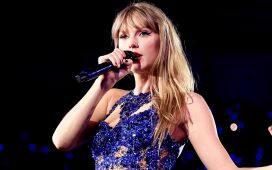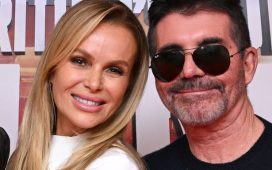“Building bridges through music and the arts as a means to achieving greater understanding and peace in the region”
Stephen Fry, Sharon Osbourne, Scooter Braun and KISS’ Gene Simmons are among the names leading a letter speaking out against a suggested boycott of the upcoming Eurovision Song Contest in Israel.
Set to take place in Tel Aviv in May with Madonna confirmed to perform, the annual competition has sparked much controversy due to its location. Earlier this year, Vivienne Westwood, Wolf Alice and Peter Gabriel were among the signatories of an open letter calling for the BBC to boycott the contest in solidarity with Palestine – arguing that taking part would be “a dubious honour” for “any artist of conscience”.
The Boycott, Divestment, Sanctions (BDS) movement argue that Israel is “shamelessly using Eurovision as part of its official Brand Israel strategy, which presents ‘Israel’s prettier face’ to whitewash and distract attention from its war crimes against Palestinians.”

Eurovision
Now, over 100 public figures including music mogul Scooter Braun, Stephen Fry, rock veteran Gene Simmons, comedian Al Murray and Countdown co-presenter Rachel Riley have signed a letter arguing against a boycott, claiming that it would only work against the show’s “spirit of togetherness” and ultimately “subverting the spirit of the contest and turning it from a tool of unity into a weapon of division”.
“We believe the cultural boycott movement is an affront to both Palestinians and Israelis who are working to advance peace through compromise, exchange, and mutual recognition,” the letter continued. “While we all may have differing opinions on the Israeli-Palestinian conflict and the best path to peace, we all agree that a cultural boycott is not the answer.”
The letter was shared by Creative Community for Peace (CCFP). CCFP director Ari Ingel added: “The members of the entertainment industry who have signed this statement, along with the thousands of individuals who have endorsed its message, all believe in building bridges through music and the arts as a means to achieving greater understanding and peace in the region.”
Speaking against the BBC supporting and broadcasting the event from Israel, an open letter from artists published earlier this year read: “Eurovision may be light entertainment, but it is not exempt from human rights considerations.” They added that any “claim to celebrate diversity and inclusion must ring hollow”.
“We cannot ignore Israel’s systematic violation of Palestinian human rights,” their letter reads. “The BBC is bound by its charter to ‘champion freedom of expression’. It should act on its principles and press for Eurovision to be relocated to a country where crimes against that freedom are not being committed.”
Responding, the BBC denied that Eurovision had any political associations.
“The competition has always supported the values of friendship, inclusion, tolerance and diversity and we do not believe it would be appropriate to use the BBC’s participation for political reasons,” the broadcaster said. “Because of this, we will be taking part in this year’s event. The host country is determined by the rules of the competition, not the BBC.”
Lorde was scheduled to play Tel Aviv in June last year but cancelled the concert in December 2017 in the face of overwhelming pressure. Lana Del Rey also recently pulled out of Israel’s Meteor festival following controversy about her appearance.
Nick Cave, however, went on to play two shows in Israel despite opposition. In sharing a lengthy letter he sent to Brian Eno, the Bad Seeds frontman stated that he had “received a number of messages broadly relating to this issue”. Cave said that Eno had “emailed me in the hope of persuading me to reconsider [the shows]” after they were announced.
Within the message to Eno, Cave labelled the boycott as “cowardly and shameful”, while defending his decision to perform in Israel as a “principled stand against those who wish to bully, shame and silence musicians”.
“I do not support the current government in Israel,” Cave said, “yet I do not accept that my decision to play in the country is any kind of tacit support for that government’s policies.” The singer added that he is “aware of the injustices suffered by the Palestinian population”, and hopes “that their suffering is ended via a comprehensive and just solution”.
Radiohead also played a show in Israel in 2017 despite opposition. “Music, art and academia is about crossing borders not building them, about open minds not closes ones, about shared humanity, dialogue and freedom of expression,” said frontman Thom Yorke of their reasoning.
The first run of semi-finals for Eurovision 2019 begin on Tuesday, May 14, before the final takes place on Saturday, May 18.














